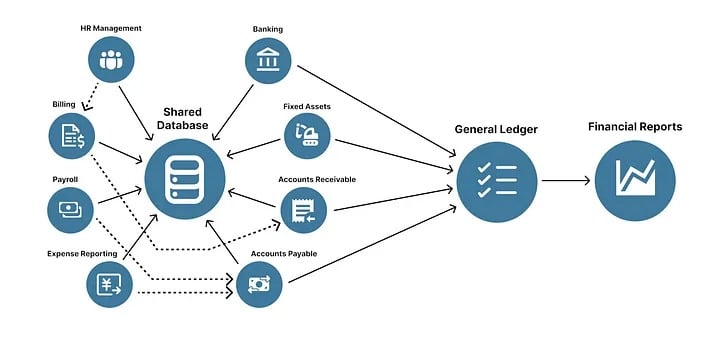ERP System: The Ultimate Guide
- ERP (Cloud) September 26,2023

Enterprise resource planning is Business process management software that allows an organization to use a system of integrated applications to manage the business and automate many back-office functions related to technology, services, and human resources. An ERP system streamlines these processes effectively.
In this guide we will show you the core points related to ERP that you need to know is a new learner or an end user of ERP System. All these points not only add knowledge to your mind, but they will also rectify lots misconceptions about the ERP System.

Key Chapters of the ERP System

The word ERP is an acronym for Enterprise Resource Planning. ERP Software can be defined as the ‘Business Process Management Software, that allows an organization to manage all its’ work process in an automated integrated system’. The term ERP was devised by Gartner in 1990.
ERP solutions eliminate redundant workflows, providing a seamless, user-friendly, and customizable interface. These solutions can help elevate your business to its full potential.
At the most basic level, we can brief that ERP Software integrates all various functions (like inventory, order management, accounts & finance, human resources, customer relationship management, payroll, supply chain, etc.) of an organization in one complete system and provides a complete system with the streamlined flow of information across the whole organization.
- What is ERP? Strategies & Examples
- A Model For ERP Solution
- What is an ERP System?
- Enterprise Resource Planning from Microsoft
- What is the definition of ERP & its Complete Solutions?
ERP solutions eliminate redundant workflows, providing a seamless, user-friendly, and customizable interface. These solutions can help elevate your business to its full potential.
- Top Five Signs Your Business Is Ready for an ERP System
- How to Choose the Right ERP Software for Your Business
- What is Cloud ERP and how it can help drive profitable growth
- Find the Right ERP to Fit Your Business
- 10 Compelling Reasons Why You Need ER
ERP System is enlisted with multiple software modules, which can be purchased separately as per the domain size and specific technical needs of an organization.
Each module of ERP System is precisely dedicated to a particular business process Area. ERP methodology extends beyond its core modules, allowing for the integration of additional modules like Customer Relationship Management (CRM), Business Intelligence (BI), Talent Management, and more.
The main goal of having ERP System is to offer a single Database Management System with the smooth flow of information across the organization.
- Basic Modules of ERP System
- What is ERP Module? Webopedia
- Types of ERP software modules
- What is the basic structure of a good ERP solution?
- Enterprise resource planning (ERP) modules guide
This chapter will include some of the most recommended & top-rated ERP Software’s in the market.
The main purpose of this to ensure the new buyers to invest in only the best solutions. We want you to choose the best appropriate solution as per your business requirements.
Make assured that you have invested in the right product, which will flourish the dream ways of business progress.
- Best ERP Software: 2015 Reviews of the Most Popular Systems
- Top ERP Software Systems – 2015 Reviews & Pricing
- What is the best ERP Software in 2015?
- Best ERP Software Comparison: Ratings and Reviews
- Buying ERP: Top 10 mid market ERP Systems
As mentioned in the first chapter, an ERP system is a set of integrated software applications. ERP System covers a wider range of functions & processes of a business organization.
At a very basic level, I can make your understanding like to run a business, we go through core business processes like inventory, order management, accounting, human resource, customer relationship and etc.
ERP System has integrated all these core processes of the business in an efficient manner. And given you a flawless streamline flow of accurate information across the organization.
The primary objective of the ERP system is to offer a unified database that supports various functions across different modules. Synchronization & automation of business processes are the core specialties of ERP System.
We cannot complete our ERP Solutions guide without talking about Cloud vs. Traditional ERP. The primary decision in choosing an ERP system for your business is between Cloud ERP and traditional on-premise ERP solutions.
Being a new retailer of ERP Systems You should be aware of the main difference between them. On-premise ERP solutions are installed directly on your organization’s hardware and servers, requiring management and maintenance by your internal IT team.
Cloud ERP, often referred to as Software as a Service (SaaS), is provided as a service. In this model, your company’s ERP software and associated data are stored in a centralized location (the ‘cloud’) by the vendor, enabling you and your employees to access them through a web browser.
- How Cloud ERP Compares to On-premise ERP
- Benefits and Drawbacks of Cloud-Based versus Traditional ERP Systems
- The Costs of Traditional ERP Systems Vs. Cloud ERP Software
- What Is Cloud ERP, and How Does It Differ from Traditional Systems?
- Five Catalysts Accelerating Cloud ERP Growth In 2015
Improved mobility is enabled by the convenience of smartphones and internet access, allowing users to connect from any location. Every year, computer scientist gives predictions about the ERP Software industry.
These predictions sometimes get right, and sometimes prove us wrong. There are some points about future predations of ERP Systems, let’s have a look. More Effectuation of ERP System over time.
As a new workforce gets added every year, that’s directly proportional to ERP System usage.
Future ERP systems will increasingly emphasize business intelligence (BI), featuring more graphical representations of processes and data from a management perspective.
- Top Five Predictions for the ERP Software Industry in 2020
- 8 Enterprise Software Predictions for 2015
- Future of ERP: Looking Ahead To 2015
- Five Trends that Will Shape the Future of ERP
- Predictions for Reinventing ERP in the Coming Years
In this chapter, we will brief out about the top ERP Vendors in the market. As a newcomer to the market, it’s common to feel overwhelmed by the array of trustworthy vendors available.
Fear not, as we will introduce you to some of the most reputable names in the industry, including SAP, Oracle, Microsoft, Infor, Epicor, Lawson, SolutionsDots, Sage, IFS, and more.
- Top 100 ERP Vendors
- Enterprise Resource Planning (ERP) software suppliers – Essential Guide
- Retail ERP: Major Products & Players
- Top 25 Cloud Applications Vendors Score Big In 2014
- Top 80 ERP Vendors Most Reliable for your Business
Nothing blows a case study to show you what’s working. Here are some amazing case studies from “in the furrows” ERP Solutions doing the hard work of bringing new innovations in IT business field.
You’ll see how others in the industry have boosted their annual financial performance by transitioning from on-premise to Cloud ERP solutions.









 Saudi Arabia (English)
Saudi Arabia (English) United Kingdom
United Kingdom Global Site
Global Site